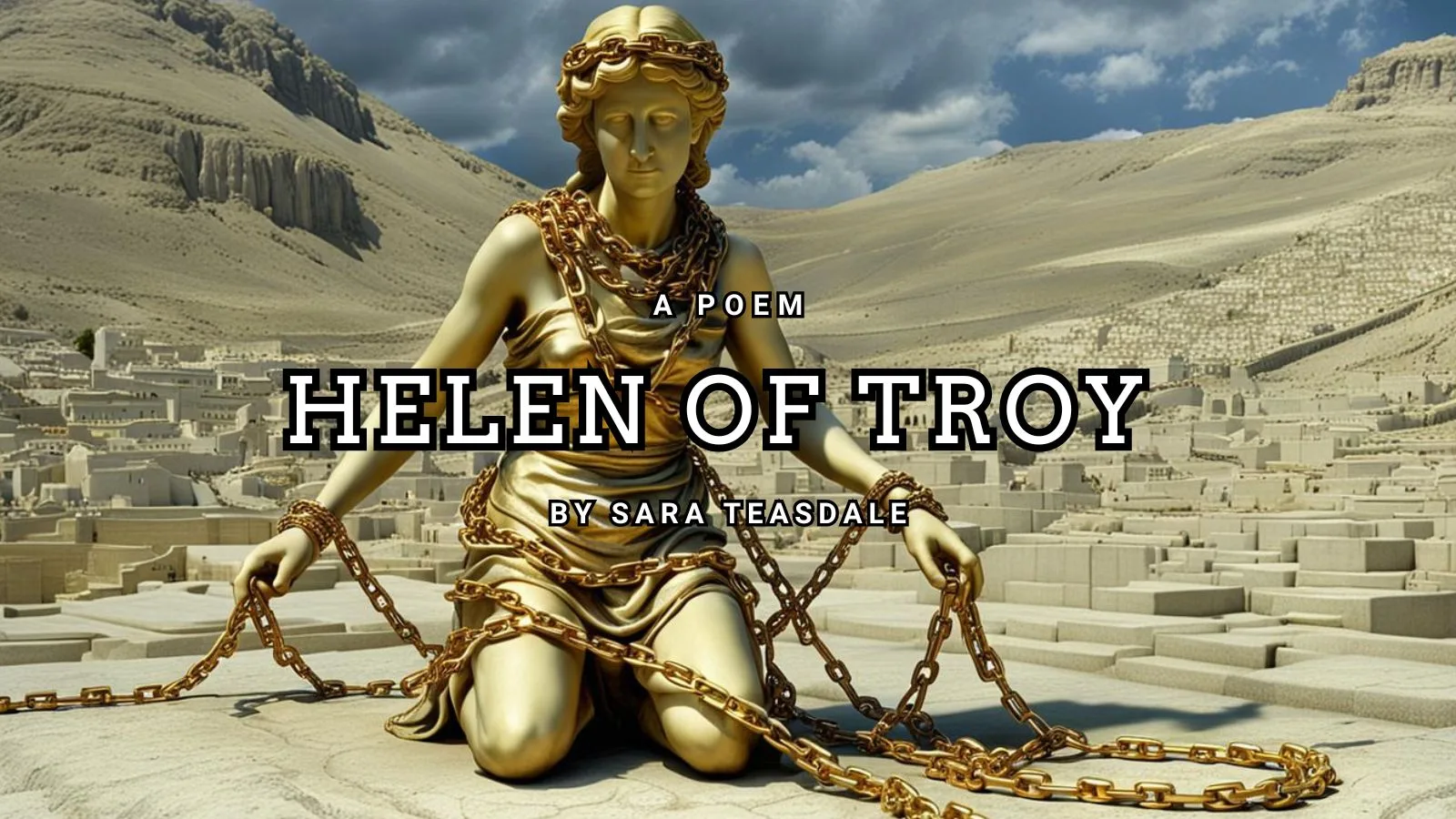Helen of Troy by Sara Teasdale

Helen of Troy
by Sara Teasdale
Wild flight on flight against the fading dawn
The flames’ red wings soar upward duskily.
This is the funeral pyre and Troy is dead
That sparkled so the day I saw it first,
And darkened slowly after. I am she
Who loves all beauty—yet I wither it.
Why have the high gods made me wreak their wrath—
Forever since my maidenhood to sow
Sorrow and blood about me? Lo, they keep
Their bitter care above me even now.
It was the gods who led me to this lair,
That tho’ the burning winds should make me weak,
They should not snatch the life from out my lips.
Olympus let the other women die;
They shall be quiet when the day is done
And have no care to-morrow. Yet for me
There is no rest. The gods are not so kind
To her made half immortal like themselves.
It is to you I owe the cruel gift,
Leda, my mother, and the Swan, my sire,
To you the beauty and to you the bale;
For never woman born of man and maid
Had wrought such havoc on the earth as I,
Or troubled heaven with a sea of flame
That climbed to touch the silent whirling stars
And blotted out their brightness ere the dawn.
Have I not made the world to weep enough?
Give death to me. Yet life is more than death;
How could I leave the sound of singing winds,
The strong sweet scent that breathes from off the sea,
Or shut my eyes forever to the spring?
I will not give the grave my hands to hold,
My shining hair to light oblivion.
Have those who wander through the ways of death,
The still wan fields Elysian, any love
To lift their breasts with longing, any lips
To thirst against the quiver of a kiss?
Lo, I shall live to conquer Greece again,
To make the people love, who hate me now.
My dreams are over, I have ceased to cry
Against the fate that made men love my mouth
And left their spirits all too deaf to hear
The little songs that echoed through my soul.
I have no anger now. The dreams are done;
Yet since the Greeks and Trojans would not see
Aught but my body’s fairness, till the end,
In all the islands set in all the seas,
And all the lands that lie beneath the sun,
Till light turn darkness, and till time shall sleep,
Men’s lives shall waste with longing after me,
For I shall be the sum of their desire,
The whole of beauty, never seen again.
And they shall stretch their arms and starting, wake
With “Helen!” on their lips, and in their eyes
The vision of me. Always I shall be
Limned on the darkness like a shaft of light
That glimmers and is gone. They shall behold
Each one his dream that fashions me anew;—
With hair like lakes that glint beneath the stars
Dark as sweet midnight, or with hair aglow
Like burnished gold that still retains the fire.
Yea, I shall haunt until the dusk of time
The heavy eyelids filled with fleeting dreams.
I wait for one who comes with sword to slay—
The king I wronged who searches for me now;
And yet he shall not slay me. I shall stand
With lifted head and look within his eyes,
Baring my breast to him and to the sun.
He shall not have the power to stain with blood
That whiteness—for the thirsty sword shall fall
And he shall cry and catch me in his arms,
Bearing me back to Sparta on his breast.
Lo, I shall live to conquer Greece again!
##
Sara Teasdale (August 8, 1884 – January 29, 1933) was an American lyric poet known for her passionate and highly personal poetry. Born in St. Louis, Missouri, Teasdale was the youngest child of a wealthy family. She was homeschooled until the age of 10 and later attended Mary Institute, a private school for girls.
Teasdale began writing poetry at a young age and published her first poem in 1907 in Reedy’s Mirror, a local newspaper. Her first collection of poems, “Sonnets to Duse and Other Poems,” was published in 1907, and her second collection, “Helen of Troy and Other Poems,” followed in 1911.
In 1914, Teasdale married Ernst Filsinger, a businessman, and moved to New York City. She continued to write and publish poetry, and her third collection, “Rivers to the Sea,” was published in 1915. This collection included some of her most famous poems, such as “I Shall Not Care” and “The Lamp.”
Teasdale’s poetry was characterized by its lyrical beauty, emotional intensity, and themes of love, heartbreak, and the natural world. She was influenced by the Romantic poets, particularly John Keats, and her work often explored the intricacies of human emotions and relationships.
Throughout her career, Teasdale received numerous awards and accolades for her poetry, including the Columbia University Poetry Society prize, the Poetry Society of America prize, and the Pulitzer Prize for Poetry in 1918 for her collection “Love Songs.”
Despite her success, Teasdale struggled with depression and poor health throughout her life. She divorced Filsinger in 1929 and moved back to St. Louis. On January 29, 1933, at the age of 48, Teasdale took her own life by overdosing on sleeping pills.
Sara Teasdale’s legacy lives on through her poetry, which continues to be widely read and admired for its beauty, emotional depth, and universal themes. Her work has influenced countless poets and has secured her place as one of the most important American poets of the early 20th century.